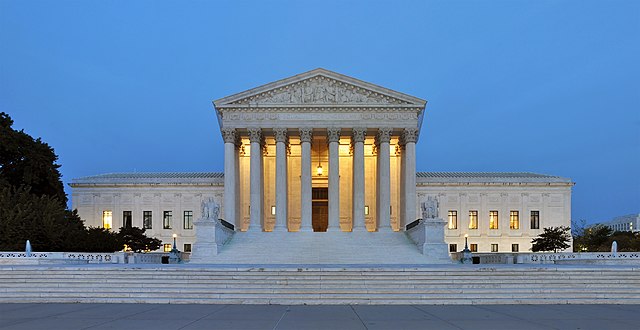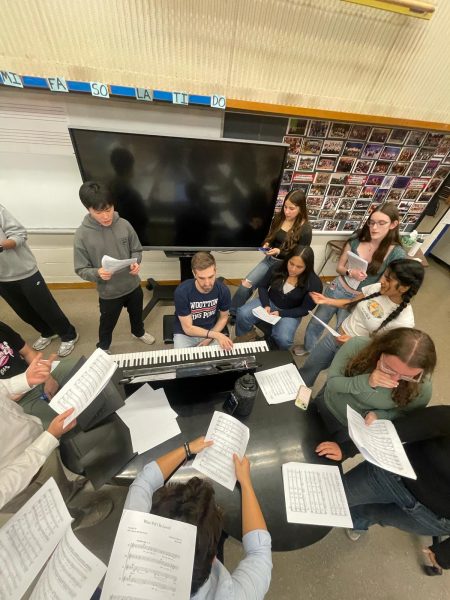Above the law: The corruption of the Supreme Courts Republican majority
Photo used with permission from Wiki Commons
The words, “equal justice under the law” are carved into the Supreme Court. This ideal does not exist for the current Republican majority.
Over the last few months, there has been a steady stream of scandalous information about the Supreme Court justices who make up the current 6-3 right-wing majority. Much of this stems from the fundamental lack of transparency and oversight on these justices, as they are not held to the same ethical agreement as every other federal judge.
Clarence Thomas and Harlan Crow: Years ago, it was first reported that Clarence Thomas had been receiving incredibly expensive gifts from a far-right donor named Harlan Crow. ProPublica recently exposed the scale of this VIP treatment included continues to receive private jet treatment, lavish vacations, and luxurious treatment all around the world. Recently new reporting showed that Crow paid the tuition of a family member of Thomas to attend a prestigious private school. This to, was not reported by Thomas, as he would have been required to disclose. Thomas claimed that this friendship with such a wealthy benefactor was irrelevant because Crow did not have business before the court. There are two problems with this defense: the first, is that these vacations, trips, and conferences Crow took Thomas on were not simply the two of them, there were Republican politicians in attendance, as well as other far-right organizations that often bring business before the court. The second issue is that Crow has had business before the court, eight times, and eight times Thomas voted in his favor.
Gini Thomas: Furthermore, there is the issue of Thomas’s wife, Gini Thomas. She has been overtly political throughout his time on the court, fundraising for Republican politicians and far-right interest groups. This took a massive step after the 2020 election, in which she supported efforts to overturn the election, even funding buses that brought insurrectionists to D.C. on Jan. 6. Thomas has refused to recuse himself from cases involving the groups his wife has worked with or even cases involving Jan. 6 itself. On May 4th, evidence was released that conservative activist Leonard Leo had paid her tens of thousands in consulting fees, none of which was disclosed by Thomas.
Neil Gorsuch:
Gorsuch, the 2017 Trump appointee after Republicans refused to fill an empty seat for the final 11 months of the Obama presidency, has also been caught up in the scandal. According to Politico, a piece of land that Gorsuch and two other people owned was sold nine days after he was confirmed to the Supreme Court, over two years after it first went on the market. The purchaser was the CEO of the sizable legal firm Greenberg Traurig, which routinely represents clients before the Supreme Court.
John Roberts:
The media is often quick to portray John Roberts as a conscionable conservative who wants to avoid the worst impulses of the current right-wing majority. Placing this narrative aside, it’s clear that he has monetized his position on the nation’s highest court to the tune of millions. His wife helps recruit lawyers to prestigious firms, for large fees, that are often chosen (by the justices) to appear before the Supreme Court. She has made millions selling his influence in a variety of cases about any given issue. It’s similar to the NRA buying the loyalty of a senator, except for one key difference: these justices serve lifelong terms. Not only should they be punished for having engaged in the rank corruption one expects of lowly politicians, they have disintegrated the expectation of a higher standard of people who deal with the law so closely and purport to be a non-political independent body.
Overall: While lower federal judges must comply with a lengthy Code of Conduct for United States Judges, the nine most powerful judges in the country are famously not bound by this code of conduct — although Chief Justice John Roberts has claimed that he and his colleagues “consult the Code of Conduct in assessing their ethical obligations.”
Vox recaps that, though Roberts in 2011 wrote that the justices do voluntarily comply with some rules that apply to lower court judges, such as a federal law imposing “financial reporting requirements” on all federal judges, he rather ominously warned that the Supreme Court “has never addressed whether Congress may impose those requirements on the Supreme Court” — leaving the clear impression that his Court might start striking down ethical statutes if Congress insisted that the justices must comply with them.
Rules for thee, but not for me. The most powerful judges in the country are different from any other federal court, in that they are more susceptible to corruption and pressure, not floating above it. They have proven unable to police themselves, making it clear there should be the strictest possible standards for the highest court in the nation.
Your donation will support the student journalists of Thomas S. Wootton High School. Your contribution will allow us to purchase equipment and cover our annual website hosting costs.
Ethan is a 2023 graduate.






![The 2025-2026 Editorial Board Alex Grainger, Cameron Cowen, Helen Manolis, Emory Scofield, Ahmed Ibrahim, Rebekah Buchman, Marley Hoffman, Hayley Gottesman, Pragna Pothakamuri and Natalie Pak (Chase Dolan not pictured) respond to the new MCPS grading policy. “When something that used to be easy suddenly becomes harder, it can turn [students’] mindset negative, whereas making something easier usually has a better impact. I think that’s where a lot of the pushback comes from. But if you put emotions aside, I do think this change could help build stronger work ethic,” Ibrahim said.](https://woottoncommonsense.com/wp-content/uploads/2025/09/fqr5bskTXpn0LRQMmKErLuNKdQYBlL726cFXBaWF-600x450.jpg)
